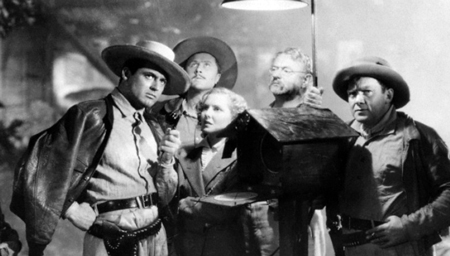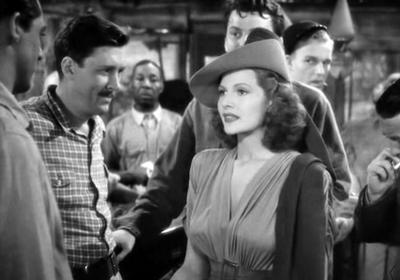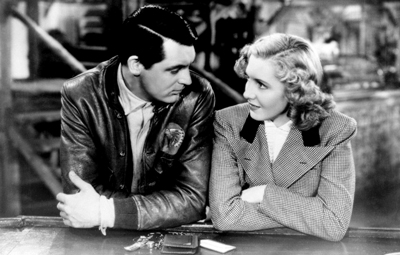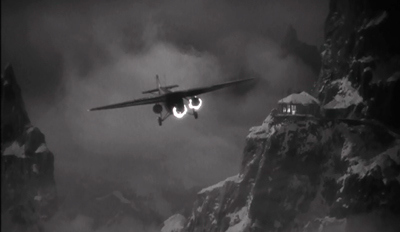Reviewed by Glenn Erickson
Some movies fully define the style of a terrific director. If this old-fashioned Howard Hawks adventure seems a custom fit, it's because he tailored it precisely to his liking. It's yet another great picture from 1939, when they say Old Hollywood was at its peak of quality output.
Only Angels Have Wings (the standard spelling 1) drops showgirl Jean Arthur into the middle of a pack of Hawksian air mail pilots, a mini-society that shuns outsiders to its customized set of rules. Outfitted in jaunty hats and slinging a gun, leader Cary Grant is the group's tough guy/old softie, a man's man fleeing the stifling influence of "women who like to make plans." Jules Furthman's script and Howard Hawks' directing of his ensemble cast are so good that we enjoy every minute we spend with them. It's a workplace, a danger zone, and a bar where 'everybody knows your name.'

The story is a mini-epic about adventurous Americans pioneering mail aviation in South America. Pilot Geoff Carter (Cary Grant) runs a broken-down airfield for local entrepreneur Dutchy (Sig Ruman), flying planes through a dangerous mountain pass in the South American Republic of Barranca. Entertainer Bonnie Lee (Jean Arthur) stops off for eight hours and is picked up by Les and Joe (Allyn Joslyn & Noah Beery Jr.), two of Geoff's fliers. After an air tragedy, Bonnie Lee learns that Geoff's best friend Kid Dabb (Thomas Mitchell) and the other hard-drinking fliers have made a communal pact with danger: if someone cracks up, it's decided that he just wasn't good enough and is forgotten. Bonnie Lee chooses to stay for a couple of weeks. Meanwhile, the aircrew grudgingly puts up with Bat MacPherson (Richard Barthelmess), a disgraced pilot with a beautiful wife (Rita Hayworth) who happens to be one of Geoff's old girlfriends -- one of the serious ones. Bonnie Lee hasn't staked a claim on Geoff... but expects him to desert his cad's principles and make their romance permanent.
Howard Hawks' best ensemble films capture qualities that new movies seem to have lost. At any given moment the screen may hold twelve people, and a single take may span five or six pages of dialogue. Hawks "invisible" cutting style encourages us to concentrate on what's happening within the frame, rather than passively react to cuts between close-ups and reverse angles. We lose our sense of 'movie time' and simply go with the flow of the present-tense action. There's no director quite like Howard Hawks in this film and The Big Sky or To Have and Have Not. Of the classic so-called 'auteurs' he's the one least likely to draw attention to his technique. Yet his technique is instantly recognizable.
Jules Furthman's screenplay establishes Bonnie Lee's probationary period as she applies for membership in Geoff Carter's all-male club. In what many women would consider a very dubious move, Bonnie Lee effectively throws herself at Geoff by purposely missing her boat. It's a Hawks fantasy that women who know what they want can just offer themselves to men, and not be grotesquely abused. Geoff Carter seems to be in the backwater Republic of Barranca for the express purpose of escaping the tyranny of women, an oft-professed ambition of Hawksian males. "Women", says Carter, try to tell men what to do. That interferes in the serious business of risking one's life, the only activity that cuts the mustard in Hawks' universe. Carter's old flame Judy (Rita Hayworth) was apparently a great playmate until she cramped his style. Her kind gets left behind.

Leave Rita Hayworth behind? Somebody's nuts. With the bedroom-eyed Cary Grant teasing dames left and right, Howard Hawks' insular world is quite a sexual fantasy. If there aren't enough Anglo babes drifting around steamy Barranca, plenty of attractive local talent is available. Flier Joe makes a serious attempt to romance Bonnie Lee even though he has a pitiful Latin American steady named Lily (Milisa Sierra) suffering on the sidelines.
Like the gold diggers of Hawks' Gentlemen Prefer Blondes, Jean Arthur's Bonnie Lee is a pro entertainer. She knows the meaning of "the show must go on," even when lives are at risk. Only Angels Have Wings balances several plots at once, but the main through line is Bonnie Lee's advancement to acceptance in Carter's world. Bonnie Lee's first lesson might be called, "How to pretend everything's ducky when one of your best friends has just died in a fiery air crash."
Neither Bonnie Lee nor Judy is quite the perfect "Hawks woman" of later films. In her star-making role, Rita Hayworth makes a sultry entrance as would Lauren Bacall in the later To Have and Have Not. Judy's status as a flyer's wife makes her ineligible for membership in the boy's club; by the end of the movie she hasn't a clue what's going on. Arthur's Bonnie Lee is the one who best fits in. She knows the score, is faster on the uptake and can hold her own dishing the dirt with the boys. Bonnie also has the all-conquering musical talent essential to success in the Hawks world -- her piano playing makes her the center of attention for the core Hawks bonding event, the sing-along. How Judy spends her free time is not discussed -- she remains loyal to her husband.

The flying milieu in Only Angels Have Wings is perfect for Hawks because it provides a non-combat arena to test the character of his manly heroes. Carter and Company withstands tough breaks while the 'male family' structure allows them to show their softer sides. It's pretty chummy down there, as everybody looks out for Geoff's love life as well as Lee's. Actor Victor Killian's radioman serves as this picture's Walter Brennan character, an old-timer who offers Bonnie advice. Thomas Mitchell's The Kid is awfully protective of Geoff, initially sending Lee away as if he had his own claim on the boss. Considering how things work out, the phrase that comes to mind is, "Over my dead body". The Kid reminds us a bit of Ernest Borgnine's character in Sam Peckinpah's The Wild Bunch, only with added sentiment.
But Richard Barthelmess's Bat McPherson speaks the original version of Borgnine's bitter line, "I wouldn't have it any other way." ("I don't know any other way I'd want it"). MacPherson wins back the respect of his peers, which is like the lifting of a death sentence. For Hawks, real men will risk anything to qualify as a worthy participant in a masculine mission, surrounded by professional colleagues. Those are the 'real' relationships. 2
Situations in Only Angels Have Wings have been successfully parodied in movies like Airplane! and The Big Bus, but the basic attraction of the original is unchanged. Hawks' formula for a masculine Utopia has universal appeal. The group's unspoken code is pretty much the basis for the test pilot philosophy represented in Tom Wolfe's The Right Stuff -- ya either got it, or you're a washout.
Hawks' production is almost entirely filmed on sound stages. The steamy port of Barranca is an immense stage interior, with a giant prop boat that pulls up to a dock and an impressive set representing a wharf, restaurant/bar/hotel/general store plus Geoff's headquarters with its adjoining airstrip, all only a few paces apart. Most of the flying is done with miniatures that can't have been convincing, even in 1939: they're all stiff toys on wires. Just the same, in this dramatic context the lack of realism doesn't matter a bit.

Contrasting with the artifice is a single stunning aerial sequence flown and directed by the famous Paul Mantz. Barthelmess must land on a tiny plateau with barren cliffs on all sides. In one unbroken shot his plane is tracked as it overshoots the ridge, circles tightly while skirting the cliff face on one side, and then pulls off a short-footprint landing. It's easily one of the best aerial takes ever filmed.
Cary Grant is excellent as an idealized man of action and ace ladykiller. He summons his reserve authority to play the Great White Flier. Jean Arthur is her delightful self, spending more time than usual in a confused funk -- or simply staying off-screen while the flyboy plot progresses. Rita Hayworth is what was once known as a solid sender. The only ridiculous part of the story is that the pilots drool all over the cute Jean, but don't even blink at the to-die-for Hayworth. I suppose this is more Hawks male fantasy: where married women are concerned, the boys are all gentlemen, even Geoff.
Silent star Richard Barthelmess is hard-bitten and haunted as the blackballed pilot. Following rule #47 in the Manly-Man codebook, he refuses to give an inch, yield to intimidation or publicly defend his alleged cowardice. The group is good spirited but also cruelly brutal to those with tainted reputations. Allen Joslyn's Les is Bat's most hostile accuser. Noah Beery Jr. ("Joe who?") is his usual lovable joker. Don "Red" Barry mans a mountaintop radio post with only a mule for company. Mustachioed John Carroll would fly again in the next year's Flying Tigers.
Wow! The TCM Vault Collection's Blu-ray of Only Angels Have Wings is clean as a whistle, a beautiful B&W show with great all-on-a-soundstage cinematography by Joseph Walker. TCM's jump to Blu-ray is really starting to pay off in great discs. This one blows away both of Sony's earlier DVD encodings. The image has the 'silver screen' texture of old nitrate prints. The movie is also available on DVD.

Jean Arthur glows in the glossy lighting, while Ms. Hayworth dazzles without needing quite as much of a camera assist. As if enduring a Hawks' style movie hazing, in one scene Hayworth's Judy gets her head dunked in water. Cary Grant had an incredible knack for looking cool doing silly things other actors would never get away with. It's a wonder that he doesn't look ridiculous entering in a broad white hat, like the Cisco Kid.
The disc extras begin with Robert Osborne noting the sterling restoration job, something he doesn't often do. A crowded menu page gives us a string of galleries of ad artwork and stills, and Frank Miller's text essay. Writing about Howard Hawks is difficult because he tended to make up whatever backstage stories pleased him, even in serious interviews. The disc finishes with a video featurette in which specialists Ben Burtt and Craig Barron examine the film's extensive miniatures and the sound effects that make them seem real. The grainy, contrast-y clips in this short serve as a reminder of what the film used to look like on video. Ben Burtt nails the Hawks appeal with his remark that Only Angels is a hard movie to walk away from -- it's so entertaining, it practically demands to be watched.
On a scale of Excellent, Good, Fair, and Poor,
Only Angels Have Wings Blu-ray rates:
Movie: Excellent
Video: Excellent
Sound: Excellent
Supplements: Text essay, galleries of artwork and photos, video interview with Craig Barron and Ben Burtt, Robert Osborne introduction.
Deaf and Hearing Impaired Friendly? NO; Subtitles: None
Packaging: Keep case in card sleeve
Reviewed: November 20, 2014
Footnotes:
1. Some aesthetes claim that a movie's official title should be how it is represented on screen, not in the advertising, which is why I've used the title card spelling for the main title of this review. That strategy has some drawbacks. In their respective title scenes, Sunset Boulevard is revealed as Sunset Blvd., Attack! turns out to be "attack" and (as some argue online) Abbott & Costello Meet Frankenstein might boil down to just Meet Frankenstein. And consider the initial release version of Apocalypse Now --- as it carried no titles or credits, should it not have a title?
Return
2. Men, work and ideology: we all know that both Howard Hawks and John Wayne claimed that they made Rio Bravo as a riposte to Stanley Kramer's High Noon. Abandoned by a worthless community, Gary Cooper's sheriff must fight the bad guys alone. His last act is to quit, tossing his badge in the dirt. That was anathema to Hawks, who famously "Don't abide quitters." (sic) Wayne's sheriff in Rio Bravo doesn't ask for civilian help. He and a couple of gunslinger buddies tell jokes, sing songs and take on the bad guys alone, like all good Howard Hawks professionals.
French director H.G. Clouzot's (1953) The Wages of Fear has a setup almost identical to that of Only Angels Have Wings, but couldn't be more politically different. Cary Grant's all-pro team voluntarily flies in steamy Barranca because they like the risk and relish the camaraderie that comes with the pilot's lifestyle. Only one of their number, Richard Barthelmess, is stuck there without enough money to leave. But he takes on risky jobs (like transporting nitroglycerine) partly because he needs to atone for a professional mistake. There's complete solidarity between the fliers and their boss, the lovable sole-proprietor Sig Rumann. The jolly old man barely keeps his airmail company in the black ink, has grave misgivings about the risks to his fliers and weeps when they die.
The Wages of Fear overturns every precept of the Hawks universe. Its unglamorous European 'adventurers' are stuck in a remote South American oil town because of bad luck or because they're running away from the law. There is no camaraderie, shared vision or personal honor. They're starving and need to cheat each other to survive; it's every man for himself. The only work offered is a suicide job, a long shot promising a dream of escape. Their boss works with an American Oil Company that needs some nitroglycerine delivered, wants it done cheaply, and sees its workers as expendable 'human resources.' It's a situation of absolute exploitation -- the men kill each other to be chosen for a suicide mission. Unlike Hawks, Clouzot sees men not as rugged individuals deciding their own fate, but powerless victims of a harsh economic system.
Each movie is a fictional story and not a documentary (we hope), yet reality doesn't favor the Howard Hawks setup as being accurate. "The mail must get through!" aviation movies were a 1930s staple. An early (1933) MGM entry called Night Flight also takes place in South America, and it shows two or three competing airmail companies already connecting cities with outlying industrial sites. If there were profitable mines or oilfields up in the Andes, Sig Rumann's Dutchy would quickly be bought out (or elbowed out) of business.
Return

Text © Copyright 2014 Glenn Erickson
See more exclusive reviews on the Savant Main Page.
Reviews on the Savant main site have additional credits information and are often updated and annotated with reader input and graphics.
T'was Ever Thus.
Return to Top of Page
|

